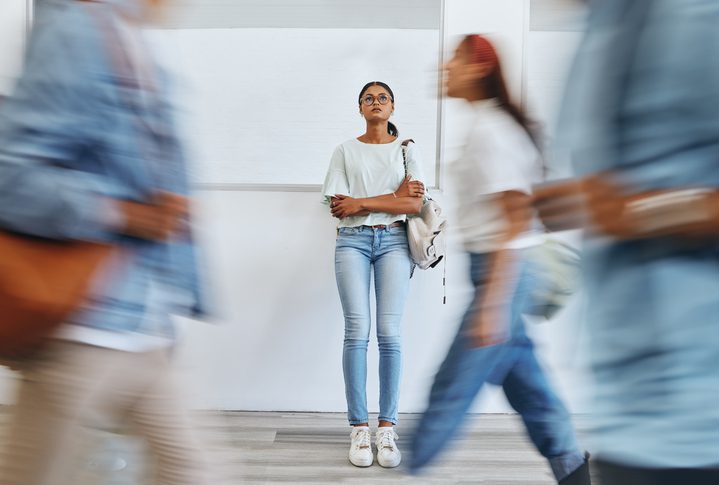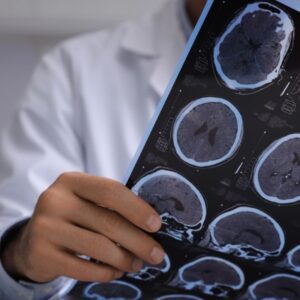About 7% of the general population has been diagnosed with a social anxiety disorder (SAD). Within this group, 20% also meet the criteria for an alcohol use disorder (AUD). These co-occurring disorders must be treated simultaneously to set the stage for a lasting recovery.
Understanding Social Anxiety Disorders
People who have social anxiety disorders find it difficult to handle a wide range of everyday tasks. This includes going to work or school, as well as attending parties or social gatherings, dating, returning items to a store, enjoying a meal at a restaurant, or having a conversation with a stranger. In severe cases, even something as simple as using a public restroom can cause an anxiety attack.
Social anxiety disorders tend to develop in the mid-teens, although younger children can sometimes struggle as well. There is some evidence to suggest that social anxiety disorders run in families, although the nature of the relationship between genetics and the environment in developing this condition is unclear. Women are about twice as likely as men to suffer from a social anxiety disorder.
Symptoms of a Social Anxiety Disorder
Having social anxiety is not the same thing as being an introvert. It is normal for some people to be naturally more reserved and to prefer spending time alone or in small groups of close friends and family. People who have social anxiety disorders experience symptoms that are constant and severe enough to interfere with their day-to-day functioning.
Everyone occasionally feels shy or uncomfortable in social situations, but people with social anxiety disorders experience the following symptoms on a regular basis:
- Avoidance of doing things or talking to people due to fear of embarrassment
- Being preemptively anxious about social events or activities
- Avoiding public speaking or other events where they might be the center of attention
- Worry about being judged negatively in social situations
- Fear of interacting or talking with strangers
- A belief that others will judge them for looking visibly anxious
- Physical symptoms that cause embarrassment, such as trembling, blushing, or sweating
- Always expecting the worst possible consequences from a social situation
- Analyzing their performance and identifying perceived flaws after a social event
Many people with social anxiety disorders also meet the criteria for a panic disorder. A person with a panic disorder strongly believes that the physical symptoms of their anxiety are the indication of a serious medical condition. They may believe they are having a heart attack, that they’re suffocating, or that they’re suffering from a mysterious illness that doctors have somehow missed. Even when reassured that there is nothing physically wrong with them, they will remain convinced that their symptoms are unrelated to their anxiety.
How Social Anxiety Disorders Lead to Alcohol Abuse
In most cases, people with social anxiety disorders start drinking as a way to temporarily relieve their symptoms in social situations. They find that they are more relaxed after a few beers or a glass of wine—and that it’s easy to blame any perceived social mishaps on the effects of alcohol consumption.
Unfortunately, alcohol is not a cure for social anxiety. Symptom relief is only temporary, and relying on alcohol to handle social situations eventually starts to cause problems of its own. Some signs of an alcohol use disorder (AUD) include:
- Drinking large amounts of alcohol to achieve the same effects
- Drinking more often than intended or feeling powerless to regulate alcohol consumption
- Having strong cravings for alcohol
- Experiencing withdrawal symptoms such as nausea, sweating, and shaking
- Being preoccupied with thoughts of obtaining or using alcohol
- Suffering from alcohol-related memory loss
- Ignoring other responsibilities or interests to spend more time drinking
- Declining performance at work or school
- Conflict in relationships with friends and family due to drinking-related behavior
- Financial problems due to the amount of money spent on alcohol
- Legal problems such as an arrest for drunk driving
Getting Help
In American culture, drinking is commonly viewed as acceptable behavior in a wide range of social situations. This makes it easy for those who are struggling with social anxiety to deny that they have a problem. However, neither condition will get better without access to professional care.
At Waypoint Recovery Center, we provide evidence-based care for men and women with substance use disorders and co-occurring mental health conditions. Care plans for clients at our South Carolina residential treatment center are personalized to fit individual needs but generally include detox followed by intensive individual, group, and family counseling as well as various holistic therapies that promote the development of a wellness-focused lifestyle.
Medication may also be recommended to address the social anxiety disorder and/or the effects of alcohol dependence. Our goal is to help clients build the foundation for lasting sobriety by addressing the issues that contributed to the development of their addiction and develop a proactive plan for handling future challenges.





